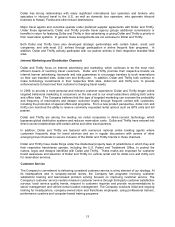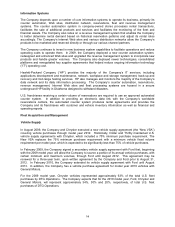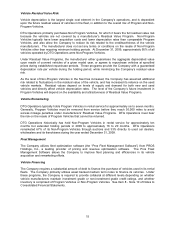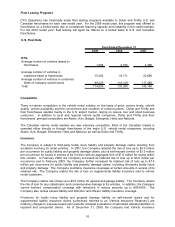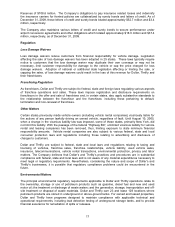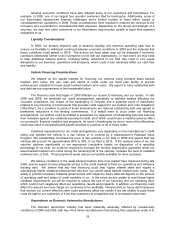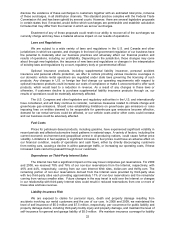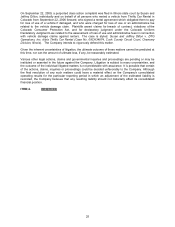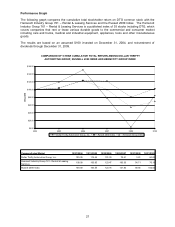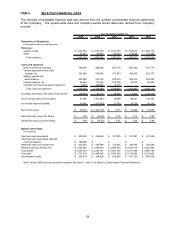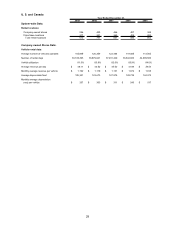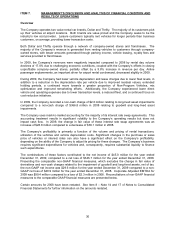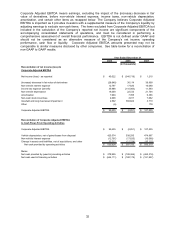Thrifty Car Rental 2009 Annual Report Download - page 24
Download and view the complete annual report
Please find page 24 of the 2009 Thrifty Car Rental annual report below. You can navigate through the pages in the report by either clicking on the pages listed below, or by using the keyword search tool below to find specific information within the annual report.claims above these self-insurance levels. We self-insure for all losses on supplemental liability insurance
policies sold to vehicle rental customers. A significant change in amount and frequency of uninsured
liability claims could negatively impact our results.
Litigation Relating to the Constitutionality of the Removal of Vicarious Liability
The federal Highway Bill removed unlimited vicarious liability for vehicle rental and leasing
companies, limiting exposure to state minimum financial responsibility amounts. Before vicarious liability
was removed, the owner of a vehicle in certain states would be liable for acts by vehicle drivers even
though the vehicle owner was not directly responsible. This federal law supersedes all state laws on
vicarious liability for automobile lessors. Since the Highway Bill became law, its constitutionality has been
challenged in some state courts, including subsequent appeals. If these provisions of the Highway Bill
were overturned, we would be subject to significant exposure to insurance liabilities and higher insurance
costs, which would materially impact our results.
Environmental Regulations
We are subject to numerous environmental regulatory requirements related to the ownership,
storage or use of petroleum products such as gasoline, diesel fuel and new and used motor oil; the
treatment or discharge of waste waters; and the generation, storage, transportation and off-site treatment
or disposal of waste materials. We have made, and expect to continue to make, expenditures to comply
with environmental laws and regulations. These expenditures may be material to our financial position,
results of operations and cash flows. We have designed programs to maintain compliance with applicable
technical and operational requirements, including leak detection testing of underground storage tanks,
and to provide financial assurance for remediation of spills or releases. However, we cannot be certain
that our programs will guarantee compliance with all regulations to which we are subject.
Environmental legislation and regulations and related administrative policies have changed
rapidly in recent years. There is a risk that governmental environmental requirements, or enforcement
thereof, may become more stringent in the future and that we may be subject to additional legal
proceedings brought by government agencies or private parties for environmental matters. In addition,
there may be additional locations of which we are currently unaware at which wastes generated by us
may have been released or disposed. In the future, these locations may become the subject of cleanup
for which we may be liable, in whole or part. Accordingly, there can be no assurance that the Company’s
future environmental liabilities will not be material to the Company’s consolidated financial position or
results of operations or cash flows.
Dependence on Outsourcing Arrangements
HP handles the majority of our IT services. If HP fails to meet its obligations in all material
respects as and when required under our agreement, we may suffer a loss of business functionality and
productivity, which would adversely affect our results. Additionally, if there is a disruption in our
relationship with HP, we may not be able to secure another IT supplier to adequately meet our IT needs
on acceptable terms, which could result in performance issues and a significant increase in costs.
Dependence on Communication Networks and Centralized Information Systems
We heavily rely on information systems to conduct our business specifically in the areas of
reservations, rental transaction processing, fleet management and accounting. We have centralized
information systems in disaster resistant facilities maintained by HP in Tulsa, Oklahoma and we rely on
communication service providers to link our system with the business locations these systems serve. A
failure of a major system, or a major disruption of communications between the system and the locations
it serves, could cause a loss of reservations, slow the rental transaction processing, interfere with our
ability to manage our fleet and otherwise materially adversely affect our ability to manage our business
effectively. Our system back-up plans, continuity plans and insurance programs are designed to mitigate
such a risk, but not to eliminate it.
Our systems contain personal information about our customers. Our failure to maintain the
security of the data we hold, whether the result of our own error or that of others, could harm our
reputation or give rise to legal liabilities, resulting in a material adverse effect on our results of operations
or cash flows.
23


